|
2 High Street
Lewisham
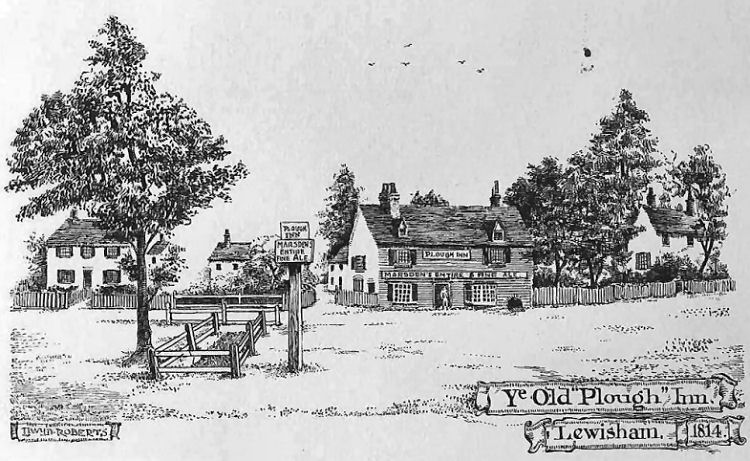
Above print 1814, by John R Llwyd Roberts. |
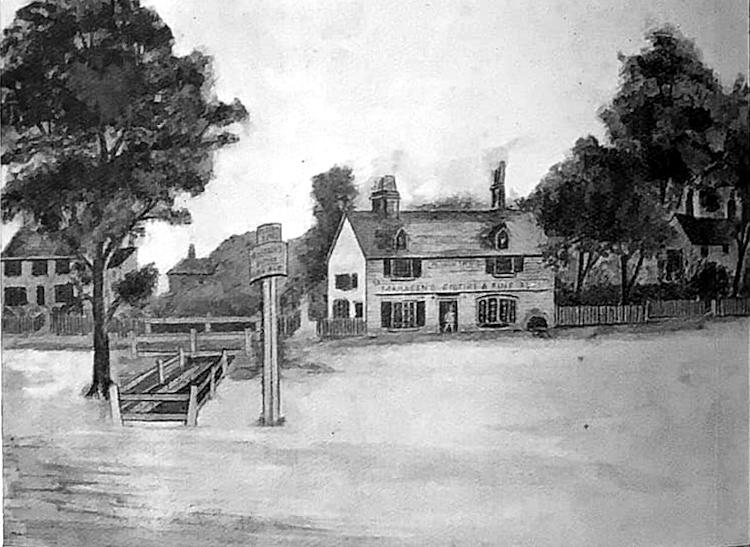
Above painting, circa 1820. |
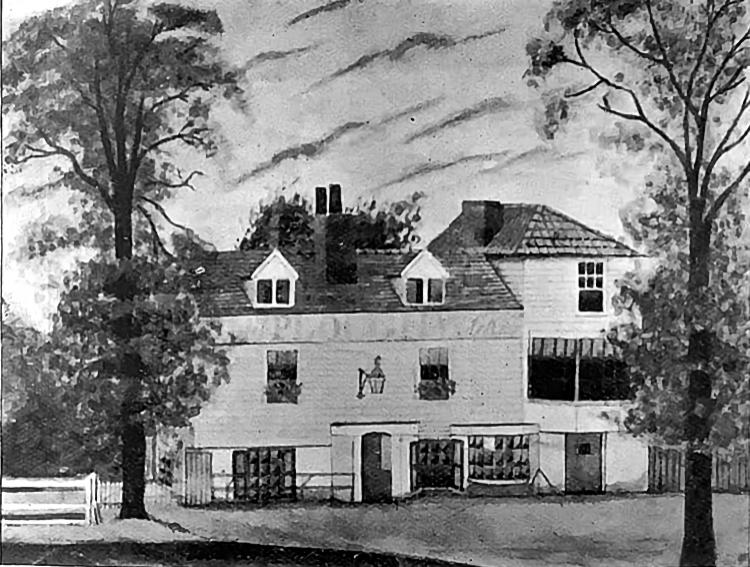
Above painting, circa 1840. |
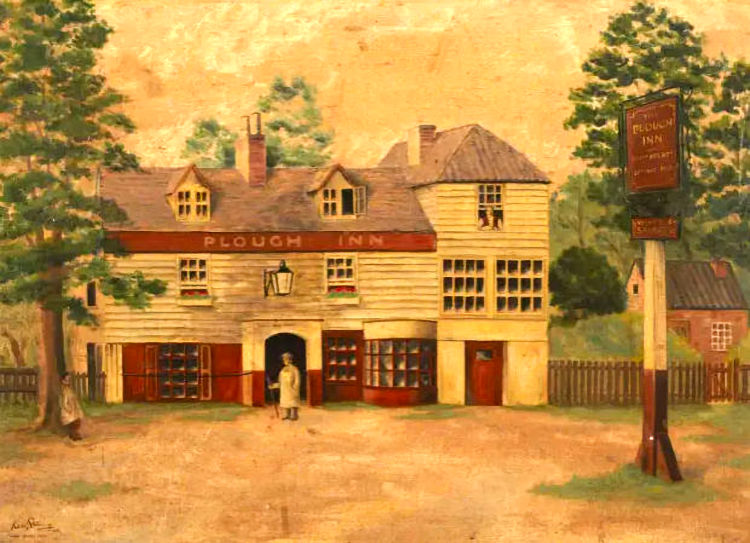
Above painting 1948 taken from the 1840 sketch. |
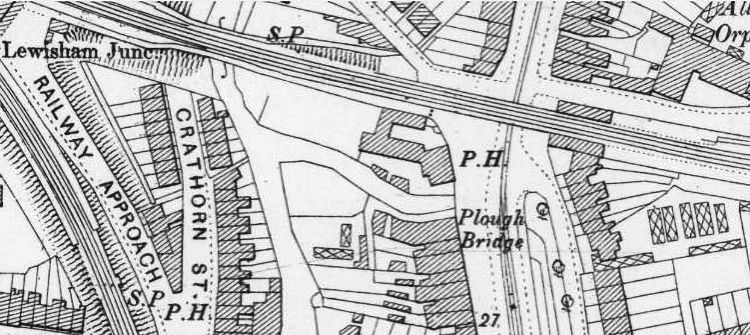
Above map, date unknown. |
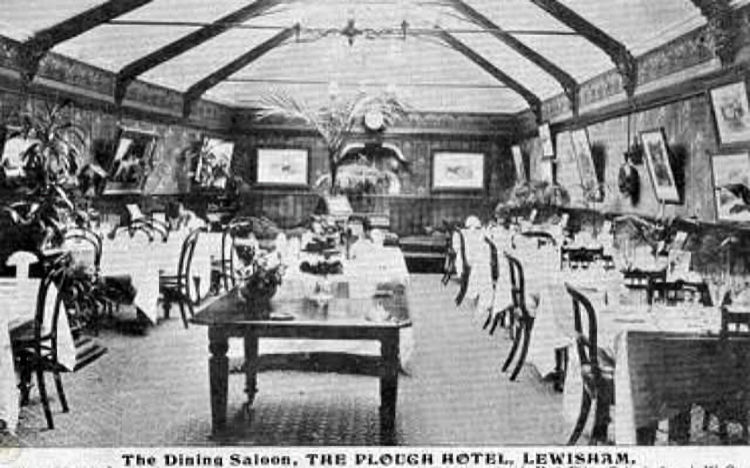
Above photo showing the dining room, date unknown. |
The Plough, has also been known as the "‘Plough Railway Tavern" around
1900 but change back again by 1911, and latterly "Pitchers Bar and Diner."
A survey from the 1740s suggests that even then the pub was in it's
second incarnation. It was a weather boarded house which sold ‘Marsden’s
Entire and Fine Ale’ which is not related to Marston’s who were 20 years off
being founded.
I have seen reference to two baptisms dating from 1806 stating a Robert
base born son (illegitimate son), of
Charlotte Hall and Robert Couldery, born 28 July 1806 at the "Plough." Also a William George Bancroft Lewis 11 August was baptised
"Hamlet in Parish Where Born" stating "at the Plough." So the pub was there
as early as 1806.
In 1814 it was owned by one of the area’s larger landowners – the Earl of
Dartmouth.
Also reference to the birth of the son of a William Miller (victualler)
in 1822.
In 1850 the old building was pulled down and rebuilt.
I am informed that in the 1970s the licensee kept a pony in the back
garden.
The pub was refurbished around 1984 including an addition of a single
lane bowling alley.
The pub changed name to the "Pitchers Bar and Diner," date unknown, but
this closed down in 2007, it was run as a ‘sports bar’ with wall-to-wall Sky
Sports.
|
From the Kentish Weekly Post or Canterbury Journal,
Tues 26 April 1825.
In the Estate of Robert Couldery An Insolvent Debtor.
Notice is hereby given that the assignee of the estate and effects of
Robert Couldery formerly of the "Fountain" public house, situate in
Stable Yard Street, in the parish of Greenwich, and then of the "Plough"
public house in the parish of Lewisham, in the county of Kent,
Victualler, who was on the 28th day of July, 1809, discharged from his
Majesty's prison of the Fleet, under and by virtue of an Act of
Parliament made and passed in the 49th year of the Reign of his late
Majesty King George III, instituted "An Act for the relief of certain
insolvent Debtors in England," will on Wednesday the 1st day of June,
1825, attend at the sign of the "Lion and Lamb," in Lewisham aforesaid,
at the hour of One of the Clock in the Afternoon precisely of that day;
for the purpose of making final Dividends out of the Net Money in hand,
arising from the Estate and Effects of the said Insolvent. And all
persons claiming to be Creditors of the said Insolvent, and entitled to
a rateable share of such funds, by their debts having secured before the
first day of February, 1809; are requested to be at the place above
mentioned, between the said our of One and Three o'clock of the same
day, at furthest, otherwise they will be excluded the benefit of such
dividend; and every creditor is to bring with him an Affidavit or do you
prove, in writing, previously sworn before some Justice or Justice's of
the peace, and in for the City of London, whereby they respectively
make out the the justice and identity of their Debts, pursuant to the
provisions of the said statute.
Jake Baddeley, Solicitor for the Assignee, 61, Lomar Street, Goodman's
Fields, London.
Robert wasn't in the Debtor's prison long, admitted early 1809 and released
later same year (according to Fleet Prison records).
|
|
From the Kentish Gazette, 7 July 1857.
APPALLING CATASTROPHE ON THE NORTH KENT RAILWAY.
In our last impression we gave an account of the terrific collision
which occurred on Sunday night week on the North Kent Railway,
causing so great a loss of life as that of eleven persons, and
inflicting injuries more or less serious on upwards of thirty
others. It occurred a few minutes before eleven o’clock at night,
between the Blackheath and Lewisham stations.
The Sunday traffic on the North Kent Railway is very heavy, and for
the necessary accommodation of persons returning from Gravesend, and
other places of holiday resort, it is usual to run two late trains
at short intervals — at 9.15 and 9.30 p.m. — from Strood to London.
This line of railway is worked on Tyer’s electric signal system, the
simple explanation of which is, that the station master at one
station must not allow a coming train to pass before the last
departed train has been telegraphed clear of the next station. This
system properly carried out, would prevent the possibility of
accident.
The scene at St. Thomas’s Hospital, the railway terminus and at the
"Plough Inn," Lewisham, where the dead bodies were lying, was
heartrending — parents seeking for their children, wives for their
husbands, and persons of all classes for relatives or friends.
It is computed that at least forty persons must have been in the
open third-class carriage upon which the break van was driven with
such dreadful consequences. Several of the passengers had
first-class tickets, but preferred to ride in the open carriage in
consequence of the oppressive heat of the evening.
DEAD BODIES IDENTIFIED.
Eight were identified, lying at the "Plough Inn," Lewisham, by
Monday night; four wounded, were lying also at the "Plough Inn," all
dangerously injured; seven were brought on to London, and are lying
in St. Thomas’s Hospital, one of whom, Mrs. Boycott of Lambetb,
expired on Saturday; thirteen, who had been brought on to St.
Thomas’s Hospital, after having their wounds dressed, were, by their
own wish, conveyed home in cabs.
Many persons in other carriages, besides that struck, were much
bruised and shaken, but all the fatal and serious eases occurred in
the last carriage, of which, after the collision, merely the floor
framework remained entire. Comparatively few of the carriages were
broken, and not more than four left the rails.
The directors of the South Eastern Railway Company immediately
instituted an inquiry into the circumstances. The pointsman and
railway officials, whose duty was to attend the signals, were at
once suspended.
MAGISTERIAL INVESTIGATION.
EXAMINATION OF THE DRIVER AND STOKER.
At the Greenwich police court, on Tuesday, Thomas Perry, 29, and
Edward Whiffen, 24, the former an engine driver and the latter a
fireman in the service of the South Eastern Railway Company, who
stand charged with "neglect of their duty in driving an engine and
train of passengers past the danger signal at the Lewisham station
on the North Kent Railway, whereby eleven persons were killed, and
several others seriously injured, in the parish of Lewisham," were
placed at the bar for examination.
Mr. Knight, the superintendent of the South Eastern Railway, was
first examined. After explaining the signal system on which the
North Kent Railway is worked, he said he was satisfied there must
have been something wrong in the telegraph communication between
Lewisham and Blackheath. The train run into had been brought up at
the Lewisham station, although it was not a station where the train
ought to have stopped. In the Blackheath station book there was an
entry of the 9.15 train having been signalled back from Lewisham to
Blackheath as "all clear" at 10.48. If that signal had been sent,
the Lewisham book ought to contain a record that it had been sent.
On referring to the Lewisham book there was no such entry.
Mr. Traill said that on leaving Blackheath the prisoners were all
correct. The question was as to their conduct after leaving the
station.
Mr. Traill adjourned the further hearing until the next day.
He declined to accept bail for the prisoners.
On Thursday the case was renewed. On Mr. Traill having ordered the
witnesses on both sides to leave the court, George Abbott, the head
guard of the 9.30 train, deposed that when he saw the red light, he
put his head out of the window, and then saw a strange light near
the ground, which he took to be a light at the end of the train in
advance. The engine-driver and fireman could see these lights if
they kept a good look out, soon after leaving Blackheath, and there
would have been time to apply the break.
E. D. Chapman, the Blackheath station master, said he was on the
platform when the 9.30 train arrived, but he left between the two
arrivals. The 9.30 train remained two or three minutes at the
station. He signalled to the guard to start, having first called to
the signal-box to see whether "all was clear up." Griffiths, the
porter at the signal, put his head out of the box and said, "All
clear up, sir," and the train left. Witness was telling Jupp, who
was standing on the platform, that he was glad his day’s work was
over, being much wearied and fatigued, and was bidding him good
night when he heard the collision. He rushed back and said to
Griffiths, "For God’s sake was the signal correct you gave me for
the last train?" Griffiths replied, "Yes, yes, it’s entered in my
book;" this was in a minute and a half after the train had left.
Witness looked at the book and saw that the column for "return
signals" was tilled, and the figures were 10.48. Witness always
relies entirely on the signal man. Witness then went to the
signal-box, and the indicator applying to Lewisham was at "stop all
up," indicating that a train was between Blackheath and Lewisham;
that implied that Lewisham had acknowledged the approaching
departure of an up train. If Lewisham had not acknowledged that the
needle would have indicated "All clear up." So that if Lewisham had
not acknowledged the departures the indicator would show the
departure of the 9.15 train. The state of the telegraph at the
Blackheath station immediately after the accident showed that either
the signal "All clear up" from Lewisham — without which the 9.30
train ought not to have started from Blackheath — had not been
received at Blackheath, or that Lewisham had acknowledged the
departure of the 9.30.
Mr. Traill:- Abbott, the guard, said he did not see you on the
platform?
Witness:- I was standing only a few yards from him.
John Nelson, station-master at Lewisham, said the 9.15 train from
Strood arrived at 10.40. He stopped it, obeying the telegraphic
communicator, which showed "Stop all up." The semaphore and distance
signals were up. The 9.15 train on coming in did not pass the
distant signal, but stopped, and afterwards came within it. It did
not come up to the platform. Passengers were waiting on the platform
for London. The semaphore and distant signal were at "Hanger" the
whole time that the train was stopping. The train remained 18
minutes before the collision occurred. The collision was at 10.55.
Witness first saw the 9.30 train when it darted under the bridge.
The engine had two white lights in front. Witness does not know of
any signal being received from Blackheath between the stopping of
the 9.15 train and the collision. David Wilde, the signal man was in
his box. Witness knows that White was aware of the train having
stopped near the station. The Mid-Kent train had passed five minutes
previously, but the red lights were still kept up.
Orders were here given to detain John Griffiths and David Wild, and
to bring them up on Saturday next.
Mr. Burgon then asked to have the fireman admitted to bail, but Mr.
Traill refused, and the case was adjourned to next day.
THE CORONER’S INQUEST.
On Tuesday Mr. Carttar opened an inquest, at the "Plough," near
Lewisham. The evidence of identity having been completed, the
coroner issued his warrant for the interment of the bodies. He then
suggested that officers of the railway should be first examined. The
case was adjourned to Friday.
On Friday the witnesses examined were Mr. John Nelson, the
station-master of Lewisham; W. C. Edmonds, of the signal department;
Samuel Laxby, office porter; G. Hughes, an extra guard; and Thomas
Hill, driver of the 9.15 train. The testimony was the same as that
given before the magistrates, which will be found in our report this
day.
Mr. Eborall, manager of the Eastern Counties Railway, was then
examined as to the want of screw-jacks and other tools at the
station. He admitted that a good supply of these articles was
necessary, but they did not expect to have these accidents upon
every portion of their line. He could not give an opinion as to
whether more lives might have been saved if there had been more
screw-jacks. It would have been a very difficult and very hazardous
thing to have I used them.
A Juror:- It is a general complaint that your up trains are behind
time, and that the cause is that you have too few hands to work the
trains.
Mr. Eborall:- I defy you to find any station in the kingdom where
there are more hands than at Lewisham and on the North Kent line
generally; and the trains on the North Kent line keep better time
than any out of London (a laugh). There was not much damage done to
the engine. Both the 9.15 and the 9.30 trains were heavy trains, on
account of the number of passengers.
The Coroner then adjourned the inquest to Friday next.
All the persons lying wounded at St. Thomas’s Hospital, and the
"Plough Tavern," Lewisham, are progressing favourably, with the
exception of Mr. Poland, whose case is precarious.
EXAMINATION OF THE ENGINE-DRIVER, SIGNAL MEN, DAN FIREMAN.
Greenwich Police Court, Saturday, July 4.
Thomas Perry, engine driver; Edward Whitten, fireman; David Wild,
signal man at Lewisham; and John Griffiths, signal man of Blackheath
station, were brought up before Mr. Traill, on remand from Thursday,
charged with neglecting their duty while driving a train, whereby
several persons were killed on Sunday evening last.
Mr. Rees appeared for the South Eastern Railway; Mr. Burgon for
Perry and Whiffen, driver and fireman of the 9.30 train; Mr. Everest
for Wild, the signalman at the Lewisham station; Mr. Smith, of the
firm of Whiteside and Smith, appeared for Griffith, signal man.
After some discussion, it was arranged that the evidence should
first be given affecting the engine driver and the fireman, and that
the case as against the signal men of the Blackheath and Lewisham
stations, should be postponed to a later period of the day, Wild and
Griffith were accordingly removed from the bar.
The first witness called was George Hughes, the under-guard of the
9.15 train, he stated that he first saw the distance signal about
half-way between the two bridges; it was a red light, and was at
danger. The train drew up within a very few yards of the semaphore
signal, and passed the danger signal at a very slow rate; the wheels
were scarcely moving. There was a tail lamp on the train; witness
saw it on the train at Strood. There was one red light, which was
the proper number, he could not see the light of the danger signal
at the point where he was standing when the accident occurred.
Cross-examined by Mr. Burgon:- Was looking for the signal as the
train was coming up from Blackheath, and the first place he saw it
was between the two bridges. Passed the distance signal at about
three miles an hour.
Re-examined by Mr. Rees:- The light was quite clear when witness saw
it — as clear as usual.
The witness having signed his deposition, Charles Wiley was called,
and the evidence given at his previous examination was read over to
him. The witness being further examined by Mr. Rees, said he was
head guard of the 9.10 train. After the accident the station-master
put some of the fog signals on the line, and the "obstruction code"
of signals were applied, he had seen the Lewisham distance signal
from the up-platform at Blackheath. The curve did not interfere with
the views of the distance signal from Blackheath.
John Nelson, station-master, was re-called, and examined by Mr.
Rees. He stated that after the collision had taken place one of the
guards started off towards Blackwall to stop anything that might be
coming. Witness called him back, and asked him to examine, in
company with him, the state of the distance-signal. Abbott, the
guard, said, "That is all correct, sir; I have seen it." Witness
said, "Never mind; look now at it," and he pronounced it, with
witness, to be excellent, in a good position, and everything
perfectly right. The signal was full danger on, and nothing whatever
wrong with it. It would have been impossible for anyone to have
interfered with, tampered with, or in any way have changed its
position, between the time of the accident and when he saw it. He
saw Parry, the driver, on the engine, and he said to him, "How is
this? How came you to pass the red light?" He replied, "Bad job, Mr.
Nelson. I did not see it in time to pull up." He made no complaint
of the light being bad, or of not being put on.
This having closed the evidence, Wild and Griffiths, the signal
porters of Blackheath and Lewisham stations, were placed at the bar,
and remanded until Monday, at one o’clock; Perry and Wiffen, the
driver and fireman, being remanded until ten o’clock on Thursday.
|
|
From the Borough of Greenwich Free Press, 11 July, 1857.
The late Fatal Accident on the North Kent Railway.
Yesterday morning Mr. Carttar, coroner for & Kent, resumed the
inquiry at the "Plough Tavern," Lewisham, into the deaths of the
eleven unfortunate individuals who lost their lives on the North
Kent Railway. The magistrate of the Greenwich Police Court having
committed the offenders for trial on a charge of manslaughter, very
little interest was attached to the inquiry, which, after the
examination of David Wild, porter and signalman at Lewisham (whose
evidence threw all the blame on the Blackheath signalman); Mr J. D.
Chapman, station master at Blackheath, who was of opinion the blame
rested between the Blackheath signalman Griffiths and the signalman
at Lewisham, Wild, and that one or the other must have been guilty
of negligence and the rear-guard and extra guard of 9.30 train; was
again adjourned until Monday next.
|
|
From the Kentish Gazette, 14 July 1857.
THE LATE CATASTROPHE ON THE NORTH KENT RAILWAY.
COMMITTAL OF THE BLACKHEATH SIGNALMAN.
On Monday David Wild, Lewisham signal porter, and John Griffiths,
Blackheath signal porter, were brought up on remand at the Greenwich
Police Court, before Mr. Traill. Mr. Trail attended on behalf of the
South-Eastern Railway Company, Mr. Everest for Wild, and a gentleman
from the office of Mr. Smith for Griffiths.
The first witness called was Samuel Saxby, the office porter at the
Lewisham station, who said that on the evening of Sunday week, when
the 9.15 train came up from Strood to the Lewisham semaphore, he was
called to take charge of the signal-box. Observed that the dials
stood "Stop all up" for Blackheath station. No change was made or
signal given while he was there.
Mr. V. T. Thompson, special pleader, was next sworn, and said:— On
the night of last Sunday week I arrived at the Lewisham station
about 20 minutes to eleven o’clock. I took my ticket, and walked
straight up the stairs to the up-platform. I saw the lights attached
to the engine of a train standing at the Blackheath end of the
platform. I saw Wild standing by the signal-box. I understood from
him that the train then waiting was not the one for me to go by. I
then looked at the dial, and saw the indicator standing "Stop all
up," and "All clear down." There were two dials, and to the best of
my recollection the indication appeared on both. I left the
signal-box about two minutes before the collision. I am sure that
was the state of the dial, for I looked two or three times. I saw no
change in it. The indicator did not show "All clear up."
I know of no distinction in the dials; I only go by what I read. I
saw two red lights at Lewisham Junction — one above the other. I saw
the lower one change to "green" about the time the Beckenham train
passed, and then again to "red." This happened I should think six or
seven minutes before the collision took place.
A printed plan of the dials was here produced by Mr. Rees, and
presented to the witness, who on examination said:— On looking at
this plan I am enabled to state that the needle was standing at
"Stop all up" at the lower left hand corner or division; it was also
standing at "stop all up" at the upper part of the left side of the
right division, Wild was in charge of the signal-box, and while I
was present I saw no other person in his place.
Mr. Rees here intimated that with respect to the prisoners now
before the bench he had no further evidence to offer.
Mr. Traill replied that under such circumstances, from the evidence
placed before him he should at once discharge Wild — who was then
admitted as a witness.
On being sworn he said:— My name is David Wild, and on last Sunday
night week, at nine o’clock, I went on duty at Lewisham as signal
night porter. About half-past ten I received the signal from
Blackheath of the departure of a train. On receiving the signal I
gave a return to Blackheath "Stop all up," signifying that the train
might come on, but that no other must follow until the signal was
altered. I made an entry immediately after I received the signal as
being at 10.32. I must have given a signal "All clear up" before
another train should leave Blackheath. I never gave such a signal to
Blackheath up to the time of the accident. I remained at my box
after receiving the signal for five or six minutes, when Mr. Nelson,
the station-master, came to me and told me to call Saxby to take my
place, as he wanted me to go to the standing train to see if they
had room for any more passengers. I was away from the box three or
four minutes, and found Saxby in charge when I returned to my box. I
was at my box at 10.48, and was in charge of it till the time of the
accident, and during that period no person could have any
opportunity of touching or altering the signals. No one else went
into my box. I received a signal of two beats on the bell from
Blackheath about a minute and a half before the accident. I looked
at the signal, but I knew they had no light to give me one, as it
was standing at Blackheath, "Stop all up." I had given Blackheath
that signal at 10.32 and up to the time of the accident it had not
been altered. The signal of the two beats I did not enter because it
was out of rule. I looked at the dial on hearing the two beats, and
shortly afterwards saw the train approaching. I then knew what it
meant.
Mr. Traill inquired if the instrument were already at "Stop all up,"
and it were necessary through an obstruction on the line,
independent of a train stopping at a station, to apprise the next
station by five beats on the bell, whether it would have any effect
on the instrument?
Mr. Knight, superintendent of the outdoor offices on the line,
replied, that as the five beats on the bell indicated " Stop all
up," and the needle of the instrument already pointed to the same,
it would have no effect, the instrument being self-acting.
Mr. Traill committed the prisoner Griffiths for trial, but ordered
him to be brought up with the other prisoners, so that they might
proceed to Newgate together; and as Mr. Thompson would not be
required to give evidence against the other prisoners, he was at
once bound over in the required sureties to attend and give evidence
at the Central Criminal Court.
The Court then adjourned.
COMMITTAL OF THE ENGINE DRIVER AND FIREMAN.
In consequence of an application made to Mr. Traill, the
investigation was resumed on Wednesday.
Mr. Rees attended for the Railway Company, Mr. Burgon for the
prisoners Perry and Whiffen, and Mr. Bilton from offices of Messrs.
Smith and Whitehead, for Griffiths.
It having been intimated that although Griffiths was formally
committed there was still some evidence to be produced, Mr. Traill
said the case was still open, and if such was the case, such
evidence should be first taken, and the other prisoners were
consequently removed from the dock.
The first witness called by Mr. Rees was Mr. J. D. Chapman,
station-master at Blackheath. He said:— I was on the platform on the
arrival and departure of the 9.15 train from Strood on last Sunday
night week, and on the arrival of the 9.30 from Strood. I merely
left for one or two minutes. Griffiths was in the signal-box the
whole of the time. I received the signal from him to start both
trains. Previously to doing so I called out to him, while standing
about 15 or sixteen yards from the box, "Is it all clear up?" He
returned, "All clear up, sir." The train then departed. About a
minute and a half afterwards I heard the crash. I do not think it
could have been heard by the prisoner, owing to his box being in a
confined space. I ran back to the signal-box and exclaimed, "For
God’s sake, Griffiths, was that signal right which you gave me for
the last train?" He replied, "Yes, sir; it is entered in my book." I
gave a momentary glance at his book, and believe that the entries in
the column of the 9.15 train were filled up. I then looked at the
dial, which presented from Lewisham "Stop all up." That might be the
signal for either train. It could not be the signal for either train
unless the "All clear up" signal had been given from Lewisham for
the 9.15 train. On the supposition that the signal given at 10.53
from Blackheath to Lewisham to the 9.30 train had not been
acknowledged by Lewisham, the "Stop all up" signal must have been
the signal of the 9.15 train; so that the state of the dial when I
saw it evidently showed that the "All clear up" had not been
received from Lewisham for the departure of the 9.15 train.
Mr. Nelson, the Lewisham station-master, re-examined:— I was on the
platform at Lewisham when the 9.15 train arrived. As near as I can
say, it was about 10.40. Ordinarily that train should not have
stopped at Lewisham, but owing to the "stop all up" signal being
presented at Lewisham Junction it was necessitated. Upon its arrival
it did not come to the distance signal, but came to a stop, and then
proceeded to within the distance signal. The train remained there
without accident until about 11.55. The distance signal and the
semaphore still stood at danger. They had never been changed. The
9.30 train had precisely the same signals presented to them which
had brought up the 9.15 train. Wild, the signal man, was on duty at
the time, and on the arrival of the 9.15 train I observed him in his
box. I knew the train was there and the reason of its detention.
A corroboration of the evidence given by Wild was here entered into
by witness.
This being the whole of the evidence as regarded Griffiths.
The witnesses were then bound over to attend and give evidence
against John Griffiths at the Central Criminal Court, who stands
committed on the charge of manslaughter.
Mr. Bilton applied to have the prisoner admitted to bail, but Mr.
Trail refused, ordering his removal to Maidstone gaol till Thursday.
Perry, the engine-driver, and Whiffen, the fireman, were next placed
in the dock.
Mr. Rees briefly stated that, with reference to the prisoners, the
first witness he should call would be Thomas Hills, who said:— I was
driver of the 9.15 train from Strood on the night of the accident. I
reached Blackheath about 10.32. I was due there 10.17. We were
detained at Woolwich and Charlton by signals. While stopping at
Blackheath I looked for the signal at Lewisham, but could not see
the distance signal. It was a dark night; the moon was cloudy. When
I saw the light it was a faint red, not a clear full red. On leaving
Blackheath, not seeing a white or "all right" light on, I ran about
100 yards, and shut the steam off before I saw the red light. I then
let the train drop down to the distance signal. It is the duty of a
driver on approaching a distance signal to stop, if possible. From
the point where I first saw the distance signal I had no difficulty,
from the speed at which I was going, in pulling up at such signal.
On arriving at Lewisham I pulled up short of the semaphore signal 40
or 50 yards. I have been five years on the line. When I pass a
distance signal, when all is right, I pass at the rate of 10 or 12
miles an hour. The 9.30 passed the signal at "danger" at the same
speed I judge from what I saw. On receiving the order to start, I
often see the signals against me at the next station, caused by
shunting, or something of that sort, and if such signals are not
removed I drop down to their direction.
John Lee Harris was next called, and said:— I am clerk in the
superintendent’s office of the company. I was a passenger in the
9.15 train on the night of the accident. As I approached the
Lewisham station I saw the distance signal. It was a very good light
and I remarked to the lady who was with me that that was where we
should stop.
Mr. W. C. Edmonds, engineer, of Gravesend, was called, and produced
a plan of the line from the station to Blackheath to the Blackheath
end of Lewisham platform, making a distance of 1,285 yards.
Mr. Rees said that was the whole of the evidence he had to place
before his worship.
Mr. Traill said it would now be his duty to send the prisoners for
trial on the charge of manslaughter, but they would be again brought
up for further evidence as to the number of deaths which had
occurred. He must give due praise to Mr. Rees for the manner in
which the case had been laid before him; and the observations he had
made on particular points would be embodied in a letter to the
directors for them to act upon if applicable, a transcript of which
he should also forward to the Board of Trade.
The witnesses were then bound over and the prisoners stand committed
to take their trial at the next sessions of the Central Criminal
Court.
ADJOURNED INQUEST.
An adjourned inquest on the bodies of the persons killed by the
recent collision at Lewisham was re-opened on Friday at the "Plough
Tavern." Mr. Bodkin, the barrister, appeared for the Company; Mr.
Armstrong, for the deceased Francis Drake; Mr. Soloman for Mr.
Wilcox and Miss Howe; Mr. Norton for the relatives of J. W. Turner;
Mr. Burgon for the driver and fireman, Parry and Whiffen; Mr. W. J.
Scott for the relatives of Franklin, and Colonel Yolland for the
Board of Trade. The evidence taken first was that of David Wyld,
porter and signalman at Lewisham, who said he recollected the 9.15
train coining in. The signal was given "all clear up." After he got
the signal of the train 10.32 leaving Blackheath he made an entry in
his book. The dial-plate showed "stop all up." If the train had
gone, it was his duty to signal "all clear up;" he did not give that
signal. The signals were against the incoming train; he saw the
distance and semaphore signals were all right. Mr. Chapman, the
Blackheath station-master, then said he despatched the 9.15 train at
10.32 or 33 in consequence of having received information from the
signalman Griffiths, that all was "clear up." He did not look at the
indicator till after the accident. At 10.53 the 9.30 train arrived;
he saw the passengers get in, he then called to the signal-box, "Is
it all clear up?" Griffiths was there; his answer was, "It is all
clear up." He then called to the rear guard, Abbott, "All right,"
the train then went on. He considered the blame rested between the
signalman at Blackheath (Griffiths) and the signalman at Lewisham (Wyld).
The roar guard and extra guard of the 9.30 train then gave evidence.
The former had seen the red light at the tail of the 9.15 train; the
latter had not seen it. They both saw the distance signal against
them, and put on their breaks, thereby greatly reducing the speed of
the train.
The inquiry was adjourned till yesterday.
|
|
|
LICENSEE LIST
 COULDERY Robert 1806-09
COULDERY Robert 1806-09
MEADE John 1810+
MILLER William 1822-32+

GRIIGG William 1841-47+ (age 55 in 1841 ) )
MORRIS William 1852-58+
GAY Robert Mar/1860+
HASLER James Mar/1860-67
HASLER Mrs 1867+
JEANS Thomas 1874+
STEPHENS Joseph 1881+ (age 36 in 1881 ) )
SLADE Herbert 1882-87+
 HAWKES Henry 1891-Nov/97 (age 43 in 1891
HAWKES Henry 1891-Nov/97 (age 43 in 1891 ) )

PRANCE Francis James Nov/1897+

LEALE George 1901-07+ (age 40 in 1901 ) )
WELTON Louis Walter 1911+
 EMPTAGE Joseph S 1921-39+
EMPTAGE Joseph S 1921-39+
HURLEY Bob & Jean 1970s+
???? Roger 1984+
https://pubwiki.co.uk/Plough.shtml
 From the Pigot's Directory 1832-33-34 From the Pigot's Directory 1832-33-34
 Census Census
 Woolwich Gazette Woolwich Gazette
|





